The Society was recently gifted a package of assorted papers and photographs collected by the late Petty officer Arthur James Collins.
Collins was called up in January 1938 and served in the following HMA Ships; Australia, Albatross, Hobart and Voyager and various shore establishments.
He was discharged physically unfit for naval service in July 1944. Interestingly, whilst serving in Voyager he was one of the volunteers who participated in Operation Hush Hush, the aborted attempt to block German oil supplies through the Danube River and devised by LCDR Ian Fleming RNVR and subsequently the author of the James Bond books.
Voyager was one of the Scrap Iron Flotilla which, considering that it comprised destroyers of WWI vintage, had a very busy and productive time in the Mediterranean Sea in the early part of WW2.[1]
Amongst the papers of Petty Officer Collins’ collection was a set of three copied pages of signals which we presume were given to all crew members when the Flotilla left the Mediterranean to return to Sydney. They have been reproduced below and show the high regard in which the Flotilla was held.
22nd August 1941
The Commander-in-Chief[2], having come alongside unexpectedly with the ‘Affirmative’ showing, came onboard and asked that lower deck be cleared. This was done and the Admiral said:-
“Well, you’re off home. And I didn’t think I could allow your ship to leave without coming onboard to say a few words of goodbye to you.
You have been here nearly two years. You came in the piping day of peace.
“STUART” and the 4 other Australian destroyers formed the most substantial part of the Mediterranean Fleet, and I kept you fairly busy.
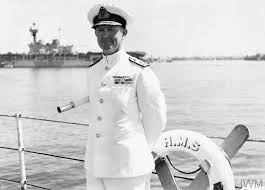
I think I said to your Captain at the time “You needn’t worry, no great war every took place without spreading to the Mediterranean” and sure enough it did.
You have done splendidly. If I were to
enumerate all the operations you have taken part in and all you have done, you would never leave Alexandria, it would take so long. One or two, however, I would like to mention.
I seem to remember, that time off the coast of Italy, when I ordered the “STUART” and the remaining Australian destroyers to go and look after the “EAGLE”. The next thing I saw was “STUART” leading the van of the destroyers after the Italian Fleet. I said “that damn fellow[3] ought to be court martialed”. But you see, he wasn’t.
If ever there was a submarine reported, I always said “send out the “STUART”.
Later on, I remember, you had a wild night at Matapan, I always wondered, when the other destroyers were sent off and “STUART” was left behind to look after the battle wagon. – I always wondered what you were saying! However, you had a night to make up for it.
I am very grateful to you for what you have done and for the example you have undoubtedly set.
A special word for the Black Squad – the Engine Room Department. They have done magnificently to keep these ships going and I am grateful to them too. Every destroyer was most valuable and had to be keep running.
We shall miss you here. The whole Fleet will part with you with great regret. We are very proud to have had you with us, and I hope you are proud to have been in the Mediterranean Fleet.
I hope you will have a very happy home coming, and that the folk down under will give you the welcome you deserve. “Good bye to you all”
As the Barge passed the stern of STUART on its way back to Admiralty House, the Commander-in-Chief stood up in the boat and waved his cap to STUART and the assembled ship’s company.
Rear-Admiral (D) said;
“I know the Commander-in-Chief has been over and said a few words to you all, so there’s not much for me to say, but as Rear-Admiral (D) I cannot let you go without coming over to see you and say goodbye.
I am sincerely grateful for the splendid service you have all done. The particular service you have been employed on since I have been here has been no easy one, but it has been cheerfully tackled by your Flotilla. You can leave with the feeling that your duty has been well and truly done.
I wish you a pleasant voyage home and a happy leave when you get there. I would be glad to see every single one of you back with me again. I hear I may see your Captain here again very soon.
Give my love to Australia and I hope you have a good time when you get there.”
Copy of Message sent by Commander -in-Chief, Mediterranean to
The Australian Commonwealth Naval Board
“It is with great regret that we part with HMAS STUART form the Mediterranean Station. Under the distinguished command of Captain Waller she has an unsurpassed record of gallant achievement. She has taken a leading part in all the principal operations of the Mediterranean Fleet and has never been called up in vain for any difficult job. The work of her engine room department in keeping this old ship efficient and in good running order has been beyond all praise.
The Mediterranean Fleet is poorer by the departure of this fine little ship and her gallant ship’s company.”
Time of origin 1102/23 Aug.1941
Other Signals
From Vice-Admiral, 1st Battle Squadron
“Goodbye, and good luck, I trust you will have the good time you deserve after all you have done here”.
From Read-Admiral (D)
“Wish you a good trip and a happy leave”.
From C.S.7
“Goodbye and I hope a good leave”.
From HMS Queen Elizabeth
“Au revoir. May you all have the good time you so richly deserve after your exceptionally good work with the Mediterranean Fleet. Everyone misses you and I doubt if Tobruk will be able to carry on without you”.
From HMS Valiant
“The best of luck to you all”.
From HMS Medway and 1st Submarine Flotilla
“Good luck”.
From Captain (D) 7.
“Goodbye. I hope we meet again before many years”.
From HMS Neptune
“Good bye and good luck. You have a long way to hop”.
End Note
HMAS Stuart survived the war.
https://www.navy.gov.au/hmas-stuart-i
HMAS Vampire was sunk in the Indian Ocean in 1942
https://www.navy.gov.au/hmas-vampire-i
HMAS Vendetta survived the war.
https://www.navy.gov.au/hmas-vendetta-i
HMAS Voyager was wrecked when she beached on Timor in 1942
https://www.navy.gov.au/hmas-voyager-i
HMAS Waterhen was sunk in the Mediterranean in 1941
https://www.navy.gov.au/hmas-waterhen-i
HMAS Stuart
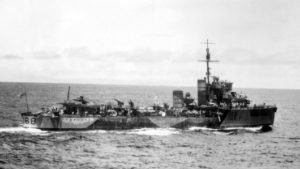
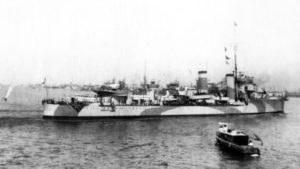
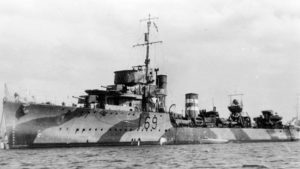
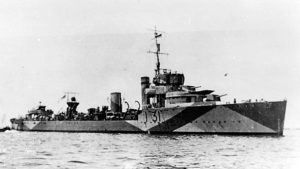
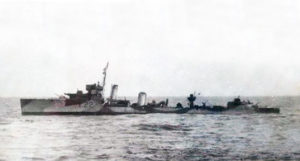
Further Reading
SCRAP IRON DESTROYERS by L J Lind and A Payne, published by The Naval Historical Society of Australia Inc. Garden Island, Sydney, NSW. ISBN 0 909153 04 3 1976[4]
[1] Between January 1940 and August 1941, the Australian Destroyer Flotilla served in the Mediterranean Sea as the 19th Destroyer Division with the Mediterranean Fleet. Ships of the Flotilla included Stuart (I) and the four aging V and W Class destroyers Vampire (I), Vendetta (I), Voyager (I) and Waterhen (I). The Flotilla was under the command of Commander HML Waller RAN (Commander (D)), in HMAS Stuart. Derisively nicknamed the ‘Scrap-Iron Flotilla’ by German propaganda, the Australian ships rapidly made their mark and gained the respect of both the Commander-In-Chief, Mediterranean Fleet and other Commanders.
[2] The Commander in Chief Mediterranean was Admiral Sir Andrew Browne (Viscount) Cunningham. His biography is available at https://www.britannica.com/biography/Andrew-Browne-Cunningham
[3] The biography of HMAS Stuart’s Commanding Officer, Captain Hector ‘Hec’ MacDonald Laws Waller is available at, https://www.navy.gov.au/biography/captain-hector-%E2%80%98hec%E2%80%99-macdonald-laws-waller
[4] This book will be republished by the Naval Historical Society of Australia in electronic format in late 2020/early 2021.




